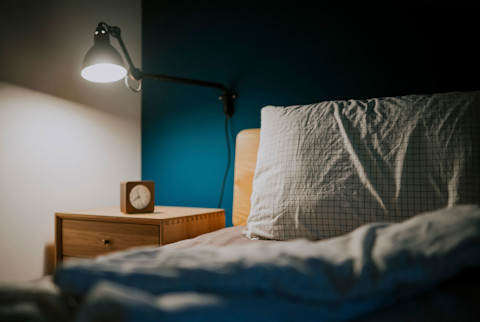
Always have trouble sleeping when you travel? You're not alone. As part of mindbodygreen's sleep series, The Wind Down, we always make a point of asking well-being experts about their favorite place they've ever slept. The most common answer, far and away, is in their own bed.
The appeal of our home setup goes far beyond cozy sheets and perfectly fluffed pillows. When we sleep in a less familiar place, we tend to experience what researchers call the "first-night effect." Even if we don't consciously realize it, our brains stay on higher alert during the night to make sure our new environment is safe. This hypervigilance can increase our sleep onset time (the amount of time it takes us to fall asleep) and decrease our time in restorative sleep stages like REM.
However, you don't necessarily have to kiss deep sleep goodby when you're on the road. If you're traveling to spend time with friends or family for the holidays, consider this your cheat sheet to sleeping well so you can show up for your loved ones as your best self.
Take the first night off from booze
Let's get the not-so-fun tip out of the way first: Keep alcohol consumption to a minimum the first night of your trip. While you may feel like it's easier to fall asleep after a cocktail or glass of wine, research shows that any alcohol (even just a glass) can suppress REM sleep. Taking night one off from booze will pay off for your energy levels the rest of your journey—and your sleep (and liver) will definitely thank you for it.
Keep up with physical activity
"Traveling for the holidays" is often synonymous with "walking less than 200 steps a day." But if you don't move your body during the day, your sleep drive—or physical desire to sleep at night—will suffer. You don't need to go crazy, but keeping up with some semblance of a movement routine on the road is key for a solid snooze. Research shows that resistance training seems to be the most effective exercise for building sleep drive, but jogging, playing a team sport, and taking a bundled walk can all be meaningful deposits in your sleep bank.
Be mindful of blood sugar
Keeping your blood sugar relatively steady can help you get more high-quality sleep (and vice versa1). And no, this doesn't need to mean passing on holiday desserts or skipping the cookie swap. You can enjoy the season's treats while keeping insulin levels in check by paring sweets with sources of protein, fiber, or fat. Here's a guide to balancing blood sugar while enjoying the foods you love.
Keep some reinforcements on hand
Taking a well-formulated sleep supplement while you travel can go a long way toward keeping your snooze as steady as possible. Reviewers of sleep support+, for example, note that the formula helps them fall asleep faster and stay asleep longer—even on the road. The non-hormonal combination of magnesium bisglycinate, jujube, and PharmaGABA® is designed to support muscle relaxation, improve sleep efficiency, and ease stress—music to any traveler's ears.*
It's even proven helpful for sleepers jumping across time zones: One reviewer notes that she started taking it after she had trouble sleeping through the night while traveling internationally for work. "Since I started taking sleep support+ in September, I've traveled to Switzerland, London, and Amsterdam. Once I touch down in a new place, I take sleep support+ about an hour before I want to fall asleep. No matter what time zone I'm in, I'm able to acclimate quickly and get high-quality sleep from the very first night," she writes.*
Stick to your usual routine
Finally, sleep loves consistency, so anything you can do to replicate your usual routine on the road will be helpful. Ideally, you can go to bed and wake up around the same time that you do at home. If this isn't possible, adjusting your sleep environment to be as cool, dark, and quiet as your at-home setup will also make a positive difference. (Eye masks and portable sound machines can be life-saviors here.) If all else fails, turn to visualization: Before bed, take a few deep breaths and visualize your bedroom at home to help you drift away to dreamland.
The takeaway
It's very normal to have trouble sleeping when you're not in your own cozy, perfectly personalized bed. If you're traveling for the holidays, being intentional with alcohol, staying active, minding your blood sugar, taking a sleep supplement, and sticking to your usual routine as much as possible will help you get the sleep you need to wake up refreshed and ready to ring in the last few days of the year.

